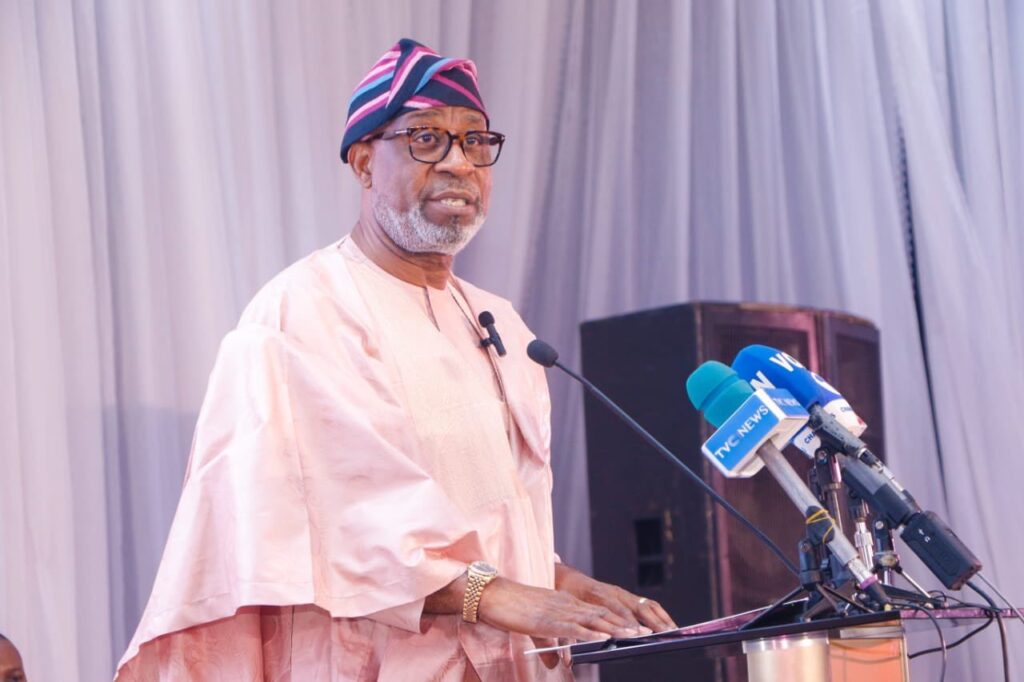Solid Minerals To Sustain Nigeria’s Economy After Fossil Fuel – Alake

By Grace Samuel
Minister of Solid Minerals Development, Dele Alake, has stated that the country will rely on its solid minerals deposits to sustain the economy as the globe moves away from fossil fuels
This is coming as the Minister revealed that a recent data estimation pegs the country’s mineral deposits at $700 billion dollars.
Alake stated this during the commissioning of the National Seismic Monitoring station-5 Katampe, in Abuja, on Tuesday.
He said the country’s minerals deposit estimates may soon run into trillions of dollars if the scope of geo-data is expanded to cover the entire country.
“The world is moving away from fossil fuel because of its contribution to global warming, and its adverse effects on the environment. The oil revenue is dwindling so we have no choice but to go back to the soil and Solid Minerals is a next savior of Nigeria whether we like it or not.
“The globalization of our marketing efforts are generating a lot of global interest in solid minerals. So we have droves of investors foreign and local, making inquiries, wanting to get into the solid minerals game.
“Infact at the last estimate by a foreign institution, based on the limited geo data available, it is estimated that we have over $700 billion worth of minerals under our soil. And that’s just the limited data available. Imagine when we expand the scope of geo data to cover the entire country. We’ll be talking about trillions and trillions of dollars worth of minerals embedded in our soil.
“So the future of this country is extremely bright. What we need to do is to exude confidence in our ability and capacity to weather the storm of restructuring, economic and societal restructure. We must also restructure our minds. Our mental capacity, we must restructure it.
“The NGSA and, of course, the Ministry of solid minerals has taken this bold step to monitor seismic tremors anywhere in Nigeria and we are going to expand the scope to cover more areas,” he said.
The minister pointed out that the federal government was monitoring incidents of earth tremor in different parts of the country in order to take steps towards avoiding disaster.
“In 2016 alone, Nigeria witnessed two occurrences of earth tremor in Bayelsa and Shaki. A year later in 2017, another tremor occurred in Kwoi, Kaduna State resulting in minor damages on buildings and road infrastructures and on 5th September, 2018, the Mpape tremor took place affecting areas such as Maitama, Katampe and part of Gwarinpa. Just when the dust was about to settle, another earth shaking was felt at Panama street of Maitama District on November 1st, 2018.
“The absence of a single seismic detection and monitoring instrument in the FCT then has hindered proper understanding of the nature and origin of these tremors. The Ministry after gathering reports on the likely causes of the tremor from NGSA and other relevant bodies immediately banned all quarrying and drilling activities within the FCT as temporary measures and directed the immediate installation of earthquake monitoring stations in strategic locations around the FCT.
“These stations are located in University of Abuja Gwagwalada, Nasarawa State University, Keffi and the Veritas University, Bwari with the centre at NGSA Headquarters Utako. Other stations are NGSA Offices in Kaduna and Ilorin. These seismic monitoring stations will enable the detection and monitoring of future occurrence of earthquake and tremor in and around the FCT and shall therefore help to upscale the level of safety in the FCT.
“In addition to the above, the data generated from the stations are critically required by researchers and construction companies to aid their decisions on siting of infrastructures such as dams, bridges, mines, processing plants, airports, high rise buildings, military and communication installations and other heavy infrastructures that require competent and stable foundations,” he stated.
Earlier, the Director General of NGSA, Dr AbdulRazaq Garba said the consequences of destructive ground motions including earthquakes could place a heavy burden on the society and national economies, particularly in developing countries.
He said, in order to avoid or at least to mitigate the negative effects of such events a thorough scientific knowledge of their geological and geophysical causes, their structural, kinematics and dynamic characteristics as well as a developed capability is required.
